MGT211 Report: Evaluating Retailers' Ethical Responsibilities in India
VerifiedAdded on 2022/09/01
|10
|2085
|26
Report
AI Summary
This report, prepared for MGT211, evaluates the ethical responsibilities of clothing retailers who source products from Indian manufacturers, focusing on the documentary 'Blood, Sweat & T-shirts'. It examines the ethical duties of retailers, highlighting issues like child labor, working conditions, and transparency. The report analyzes the current narrow view of Corporate Social Responsibility (CSR) adopted by retailers, contrasting it with a broader view and supporting the latter using Kant's ethical theory. It argues for the importance of a broader CSR perspective to address the negative impacts of the fashion industry on society and recommends that retailers implement ethical sourcing norms, including the elimination of child labor, fair wages, and safe working environments. This report provides a comprehensive overview of the ethical challenges and responsibilities within the global clothing supply chain, offering valuable insights for retailers and students alike.
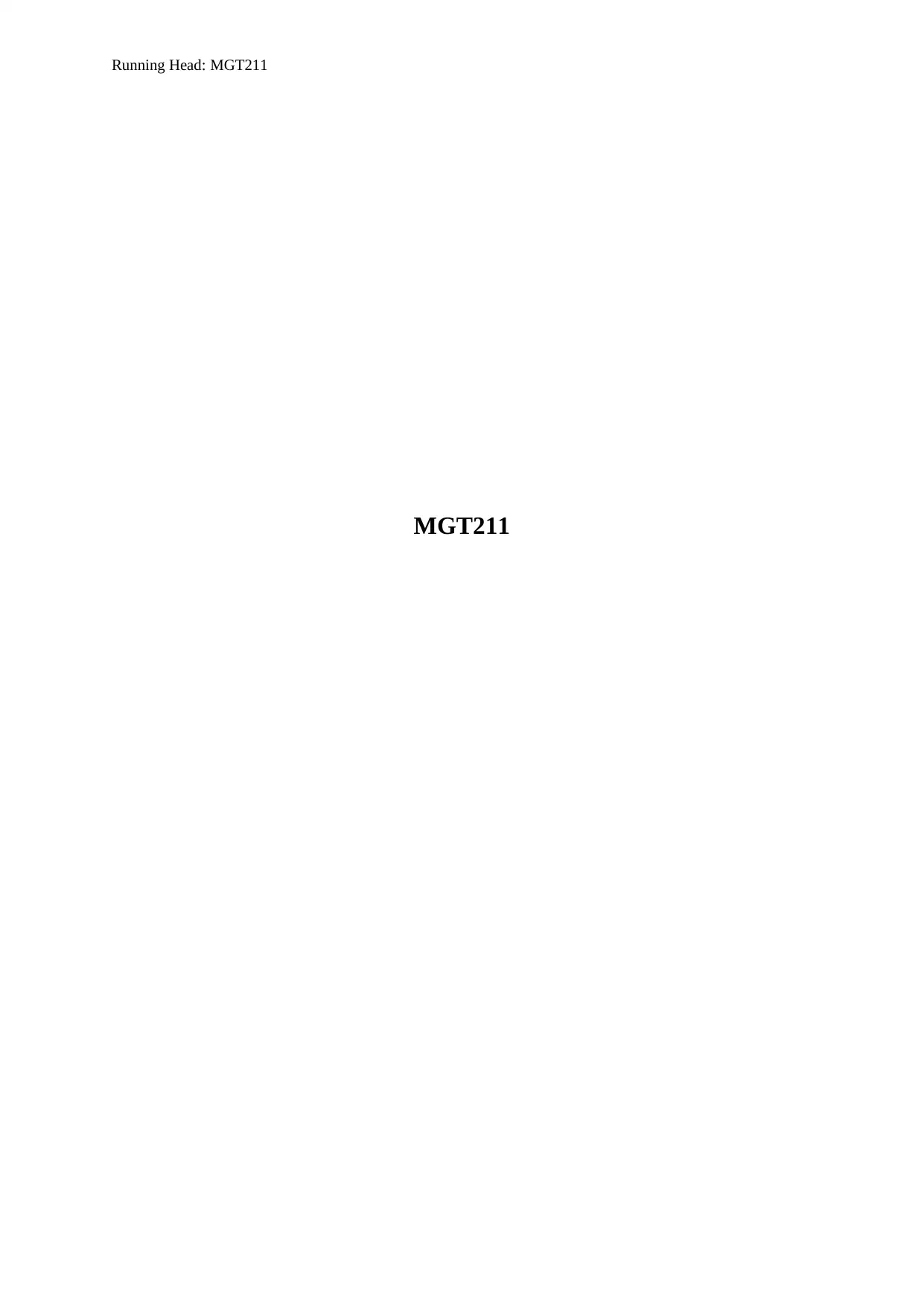
Running Head: MGT211
MGT211
MGT211
Paraphrase This Document
Need a fresh take? Get an instant paraphrase of this document with our AI Paraphraser
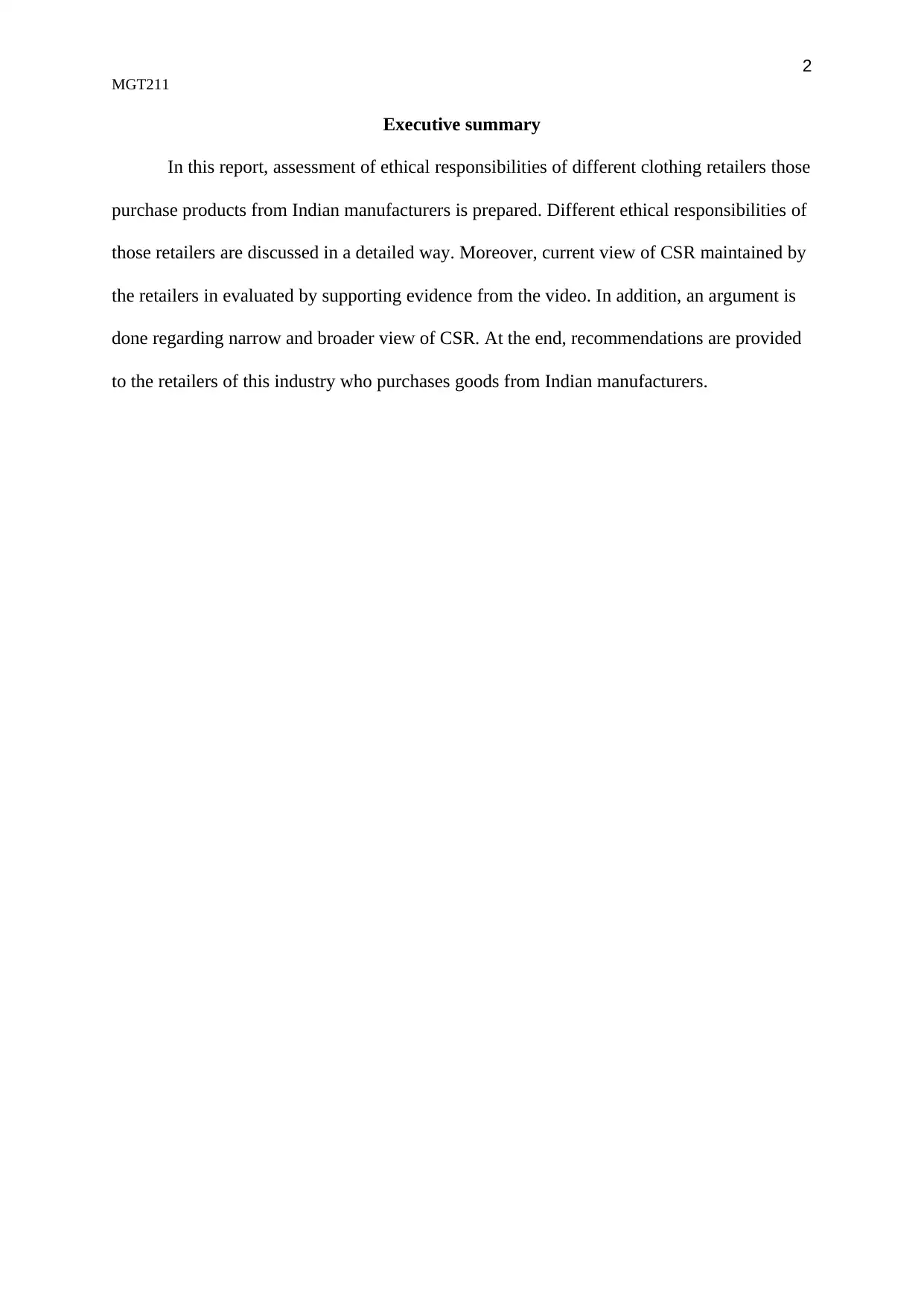
2
MGT211
Executive summary
In this report, assessment of ethical responsibilities of different clothing retailers those
purchase products from Indian manufacturers is prepared. Different ethical responsibilities of
those retailers are discussed in a detailed way. Moreover, current view of CSR maintained by
the retailers in evaluated by supporting evidence from the video. In addition, an argument is
done regarding narrow and broader view of CSR. At the end, recommendations are provided
to the retailers of this industry who purchases goods from Indian manufacturers.
MGT211
Executive summary
In this report, assessment of ethical responsibilities of different clothing retailers those
purchase products from Indian manufacturers is prepared. Different ethical responsibilities of
those retailers are discussed in a detailed way. Moreover, current view of CSR maintained by
the retailers in evaluated by supporting evidence from the video. In addition, an argument is
done regarding narrow and broader view of CSR. At the end, recommendations are provided
to the retailers of this industry who purchases goods from Indian manufacturers.

3
MGT211
Table of Contents
Introductions..............................................................................................................................4
Findings/Analysis.......................................................................................................................4
Conclusion/recommendations....................................................................................................7
Reference list..............................................................................................................................9
MGT211
Table of Contents
Introductions..............................................................................................................................4
Findings/Analysis.......................................................................................................................4
Conclusion/recommendations....................................................................................................7
Reference list..............................................................................................................................9
⊘ This is a preview!⊘
Do you want full access?
Subscribe today to unlock all pages.

Trusted by 1+ million students worldwide
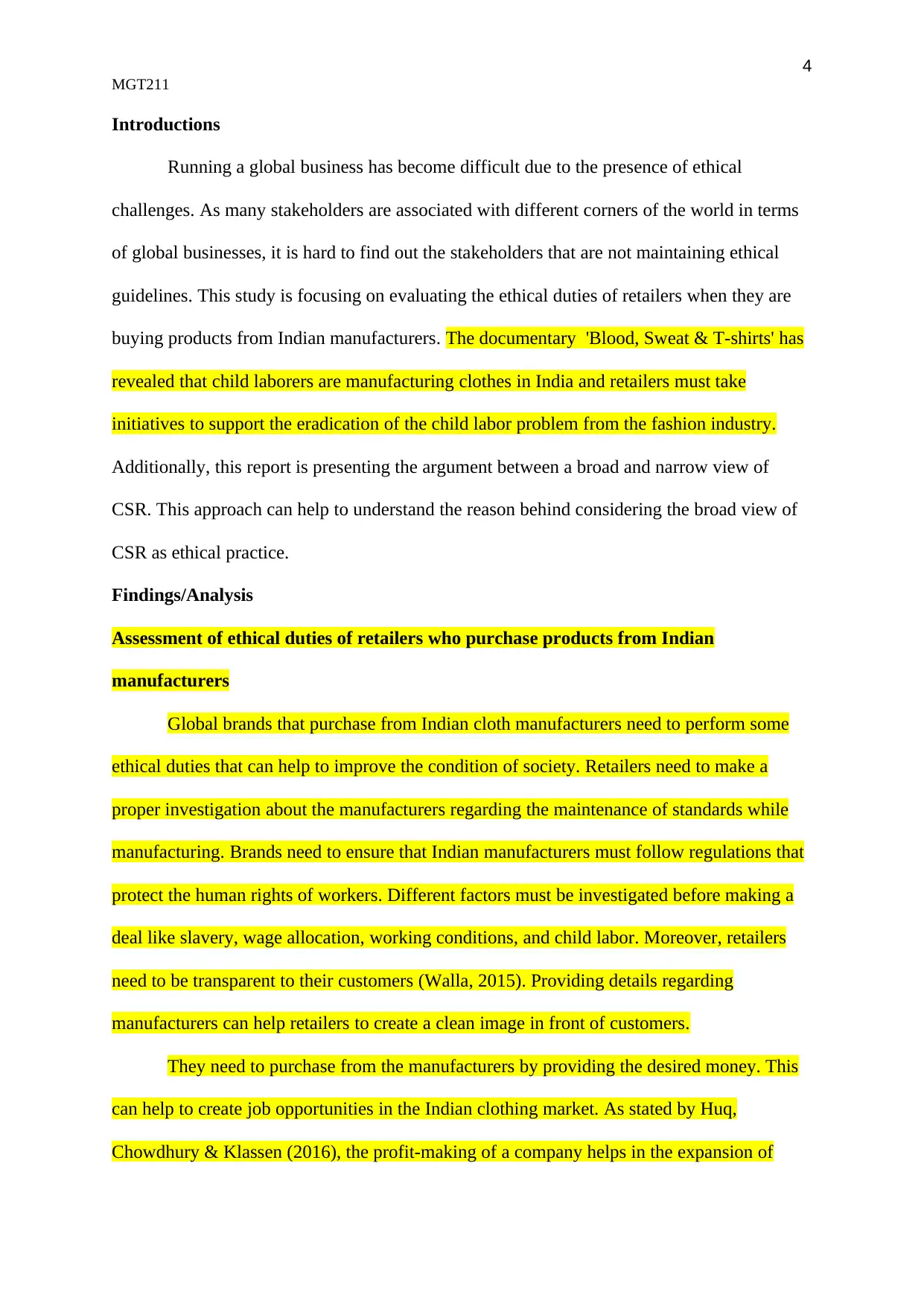
4
MGT211
Introductions
Running a global business has become difficult due to the presence of ethical
challenges. As many stakeholders are associated with different corners of the world in terms
of global businesses, it is hard to find out the stakeholders that are not maintaining ethical
guidelines. This study is focusing on evaluating the ethical duties of retailers when they are
buying products from Indian manufacturers. The documentary 'Blood, Sweat & T-shirts' has
revealed that child laborers are manufacturing clothes in India and retailers must take
initiatives to support the eradication of the child labor problem from the fashion industry.
Additionally, this report is presenting the argument between a broad and narrow view of
CSR. This approach can help to understand the reason behind considering the broad view of
CSR as ethical practice.
Findings/Analysis
Assessment of ethical duties of retailers who purchase products from Indian
manufacturers
Global brands that purchase from Indian cloth manufacturers need to perform some
ethical duties that can help to improve the condition of society. Retailers need to make a
proper investigation about the manufacturers regarding the maintenance of standards while
manufacturing. Brands need to ensure that Indian manufacturers must follow regulations that
protect the human rights of workers. Different factors must be investigated before making a
deal like slavery, wage allocation, working conditions, and child labor. Moreover, retailers
need to be transparent to their customers (Walla, 2015). Providing details regarding
manufacturers can help retailers to create a clean image in front of customers.
They need to purchase from the manufacturers by providing the desired money. This
can help to create job opportunities in the Indian clothing market. As stated by Huq,
Chowdhury & Klassen (2016), the profit-making of a company helps in the expansion of
MGT211
Introductions
Running a global business has become difficult due to the presence of ethical
challenges. As many stakeholders are associated with different corners of the world in terms
of global businesses, it is hard to find out the stakeholders that are not maintaining ethical
guidelines. This study is focusing on evaluating the ethical duties of retailers when they are
buying products from Indian manufacturers. The documentary 'Blood, Sweat & T-shirts' has
revealed that child laborers are manufacturing clothes in India and retailers must take
initiatives to support the eradication of the child labor problem from the fashion industry.
Additionally, this report is presenting the argument between a broad and narrow view of
CSR. This approach can help to understand the reason behind considering the broad view of
CSR as ethical practice.
Findings/Analysis
Assessment of ethical duties of retailers who purchase products from Indian
manufacturers
Global brands that purchase from Indian cloth manufacturers need to perform some
ethical duties that can help to improve the condition of society. Retailers need to make a
proper investigation about the manufacturers regarding the maintenance of standards while
manufacturing. Brands need to ensure that Indian manufacturers must follow regulations that
protect the human rights of workers. Different factors must be investigated before making a
deal like slavery, wage allocation, working conditions, and child labor. Moreover, retailers
need to be transparent to their customers (Walla, 2015). Providing details regarding
manufacturers can help retailers to create a clean image in front of customers.
They need to purchase from the manufacturers by providing the desired money. This
can help to create job opportunities in the Indian clothing market. As stated by Huq,
Chowdhury & Klassen (2016), the profit-making of a company helps in the expansion of
Paraphrase This Document
Need a fresh take? Get an instant paraphrase of this document with our AI Paraphraser
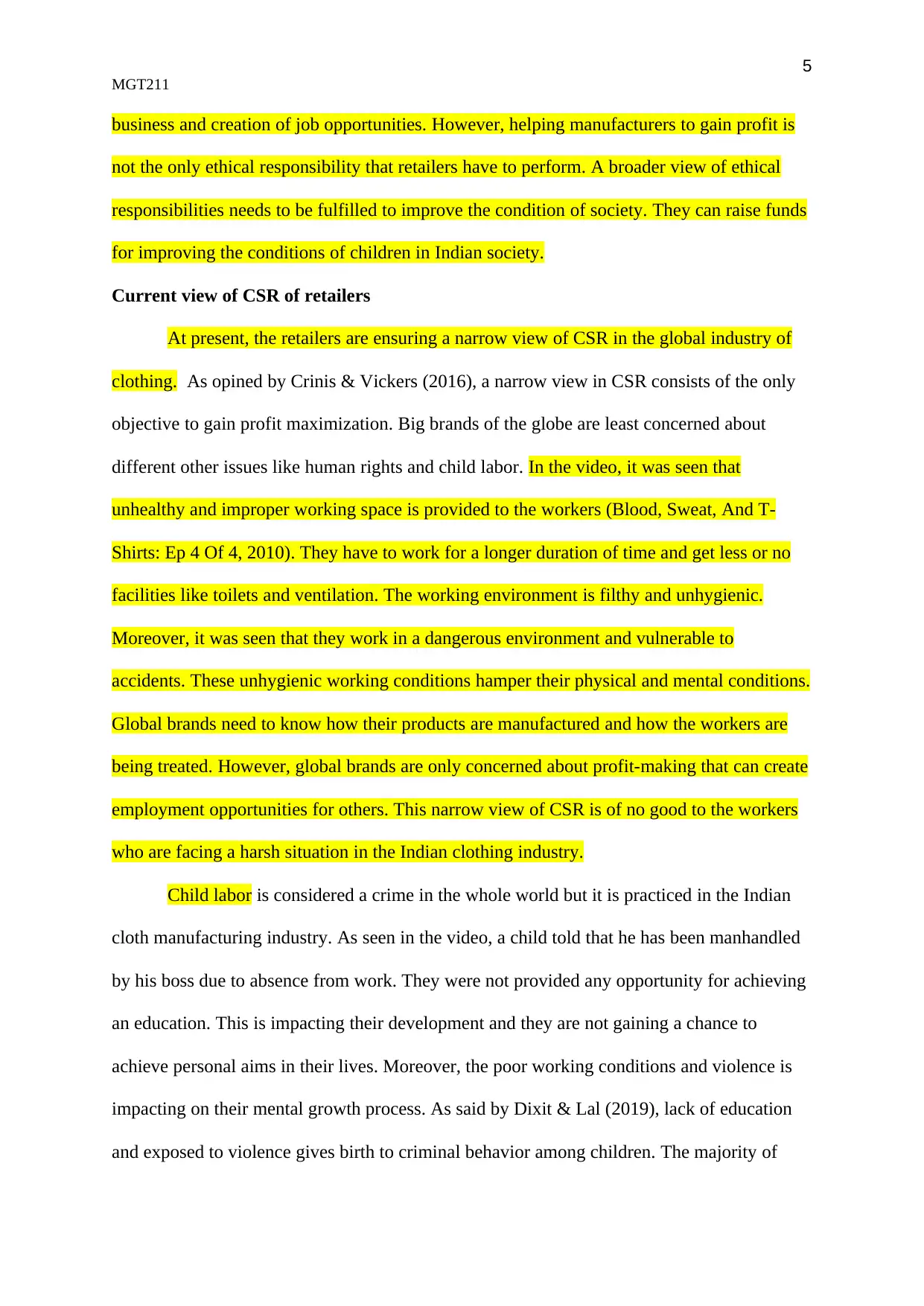
5
MGT211
business and creation of job opportunities. However, helping manufacturers to gain profit is
not the only ethical responsibility that retailers have to perform. A broader view of ethical
responsibilities needs to be fulfilled to improve the condition of society. They can raise funds
for improving the conditions of children in Indian society.
Current view of CSR of retailers
At present, the retailers are ensuring a narrow view of CSR in the global industry of
clothing. As opined by Crinis & Vickers (2016), a narrow view in CSR consists of the only
objective to gain profit maximization. Big brands of the globe are least concerned about
different other issues like human rights and child labor. In the video, it was seen that
unhealthy and improper working space is provided to the workers (Blood, Sweat, And T-
Shirts: Ep 4 Of 4, 2010). They have to work for a longer duration of time and get less or no
facilities like toilets and ventilation. The working environment is filthy and unhygienic.
Moreover, it was seen that they work in a dangerous environment and vulnerable to
accidents. These unhygienic working conditions hamper their physical and mental conditions.
Global brands need to know how their products are manufactured and how the workers are
being treated. However, global brands are only concerned about profit-making that can create
employment opportunities for others. This narrow view of CSR is of no good to the workers
who are facing a harsh situation in the Indian clothing industry.
Child labor is considered a crime in the whole world but it is practiced in the Indian
cloth manufacturing industry. As seen in the video, a child told that he has been manhandled
by his boss due to absence from work. They were not provided any opportunity for achieving
an education. This is impacting their development and they are not gaining a chance to
achieve personal aims in their lives. Moreover, the poor working conditions and violence is
impacting on their mental growth process. As said by Dixit & Lal (2019), lack of education
and exposed to violence gives birth to criminal behavior among children. The majority of
MGT211
business and creation of job opportunities. However, helping manufacturers to gain profit is
not the only ethical responsibility that retailers have to perform. A broader view of ethical
responsibilities needs to be fulfilled to improve the condition of society. They can raise funds
for improving the conditions of children in Indian society.
Current view of CSR of retailers
At present, the retailers are ensuring a narrow view of CSR in the global industry of
clothing. As opined by Crinis & Vickers (2016), a narrow view in CSR consists of the only
objective to gain profit maximization. Big brands of the globe are least concerned about
different other issues like human rights and child labor. In the video, it was seen that
unhealthy and improper working space is provided to the workers (Blood, Sweat, And T-
Shirts: Ep 4 Of 4, 2010). They have to work for a longer duration of time and get less or no
facilities like toilets and ventilation. The working environment is filthy and unhygienic.
Moreover, it was seen that they work in a dangerous environment and vulnerable to
accidents. These unhygienic working conditions hamper their physical and mental conditions.
Global brands need to know how their products are manufactured and how the workers are
being treated. However, global brands are only concerned about profit-making that can create
employment opportunities for others. This narrow view of CSR is of no good to the workers
who are facing a harsh situation in the Indian clothing industry.
Child labor is considered a crime in the whole world but it is practiced in the Indian
cloth manufacturing industry. As seen in the video, a child told that he has been manhandled
by his boss due to absence from work. They were not provided any opportunity for achieving
an education. This is impacting their development and they are not gaining a chance to
achieve personal aims in their lives. Moreover, the poor working conditions and violence is
impacting on their mental growth process. As said by Dixit & Lal (2019), lack of education
and exposed to violence gives birth to criminal behavior among children. The majority of
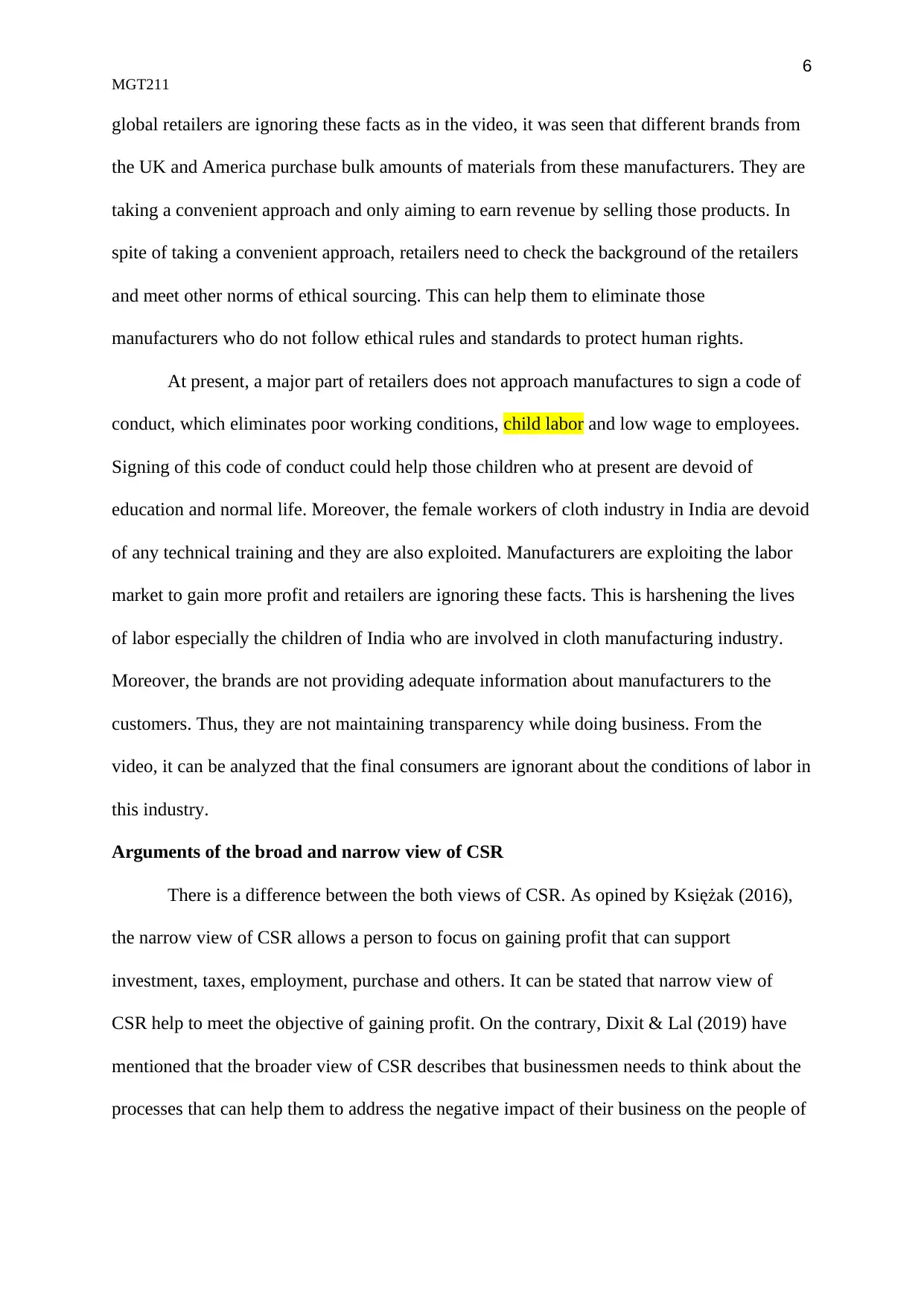
6
MGT211
global retailers are ignoring these facts as in the video, it was seen that different brands from
the UK and America purchase bulk amounts of materials from these manufacturers. They are
taking a convenient approach and only aiming to earn revenue by selling those products. In
spite of taking a convenient approach, retailers need to check the background of the retailers
and meet other norms of ethical sourcing. This can help them to eliminate those
manufacturers who do not follow ethical rules and standards to protect human rights.
At present, a major part of retailers does not approach manufactures to sign a code of
conduct, which eliminates poor working conditions, child labor and low wage to employees.
Signing of this code of conduct could help those children who at present are devoid of
education and normal life. Moreover, the female workers of cloth industry in India are devoid
of any technical training and they are also exploited. Manufacturers are exploiting the labor
market to gain more profit and retailers are ignoring these facts. This is harshening the lives
of labor especially the children of India who are involved in cloth manufacturing industry.
Moreover, the brands are not providing adequate information about manufacturers to the
customers. Thus, they are not maintaining transparency while doing business. From the
video, it can be analyzed that the final consumers are ignorant about the conditions of labor in
this industry.
Arguments of the broad and narrow view of CSR
There is a difference between the both views of CSR. As opined by Księżak (2016),
the narrow view of CSR allows a person to focus on gaining profit that can support
investment, taxes, employment, purchase and others. It can be stated that narrow view of
CSR help to meet the objective of gaining profit. On the contrary, Dixit & Lal (2019) have
mentioned that the broader view of CSR describes that businessmen needs to think about the
processes that can help them to address the negative impact of their business on the people of
MGT211
global retailers are ignoring these facts as in the video, it was seen that different brands from
the UK and America purchase bulk amounts of materials from these manufacturers. They are
taking a convenient approach and only aiming to earn revenue by selling those products. In
spite of taking a convenient approach, retailers need to check the background of the retailers
and meet other norms of ethical sourcing. This can help them to eliminate those
manufacturers who do not follow ethical rules and standards to protect human rights.
At present, a major part of retailers does not approach manufactures to sign a code of
conduct, which eliminates poor working conditions, child labor and low wage to employees.
Signing of this code of conduct could help those children who at present are devoid of
education and normal life. Moreover, the female workers of cloth industry in India are devoid
of any technical training and they are also exploited. Manufacturers are exploiting the labor
market to gain more profit and retailers are ignoring these facts. This is harshening the lives
of labor especially the children of India who are involved in cloth manufacturing industry.
Moreover, the brands are not providing adequate information about manufacturers to the
customers. Thus, they are not maintaining transparency while doing business. From the
video, it can be analyzed that the final consumers are ignorant about the conditions of labor in
this industry.
Arguments of the broad and narrow view of CSR
There is a difference between the both views of CSR. As opined by Księżak (2016),
the narrow view of CSR allows a person to focus on gaining profit that can support
investment, taxes, employment, purchase and others. It can be stated that narrow view of
CSR help to meet the objective of gaining profit. On the contrary, Dixit & Lal (2019) have
mentioned that the broader view of CSR describes that businessmen needs to think about the
processes that can help them to address the negative impact of their business on the people of
⊘ This is a preview!⊘
Do you want full access?
Subscribe today to unlock all pages.

Trusted by 1+ million students worldwide
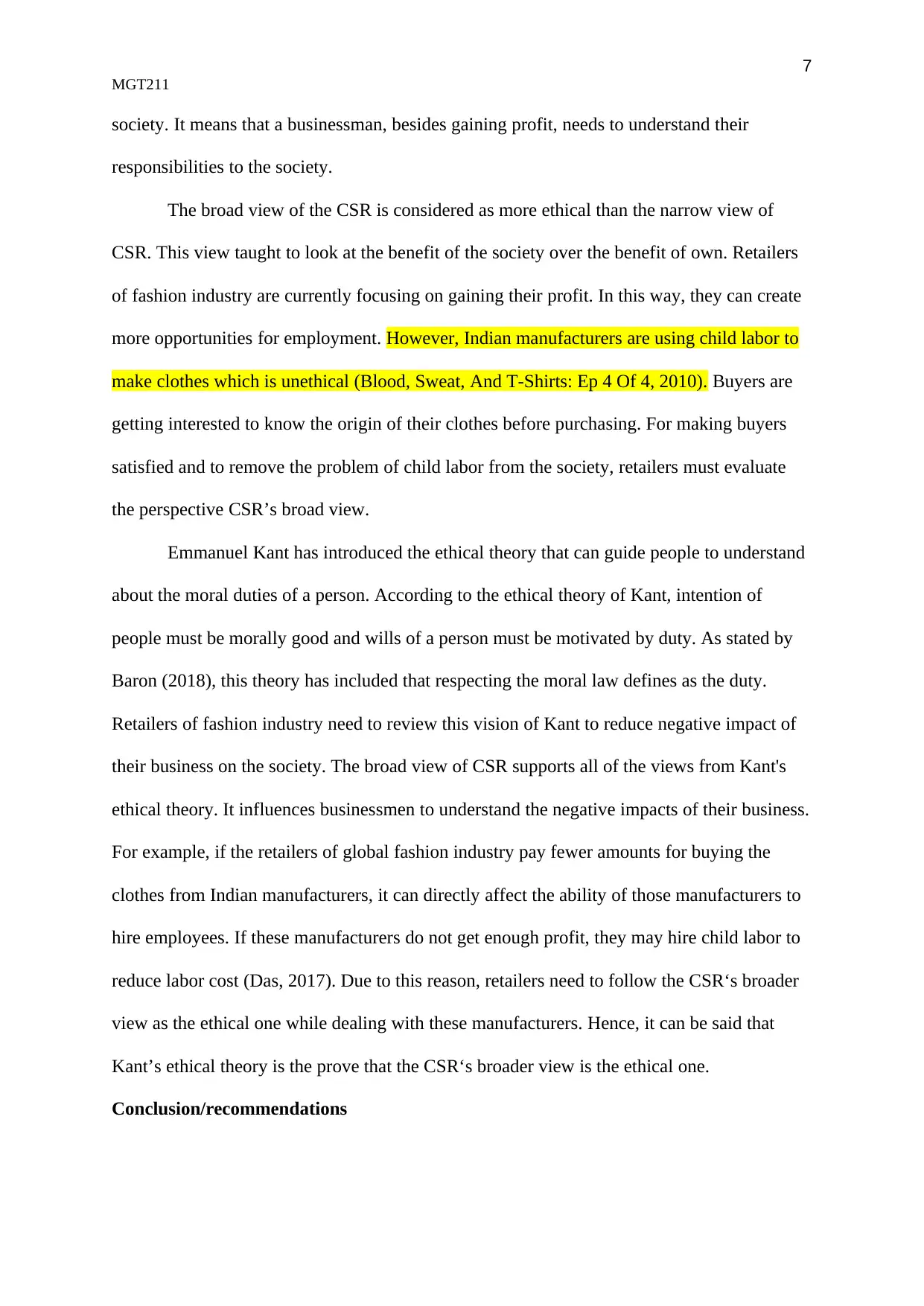
7
MGT211
society. It means that a businessman, besides gaining profit, needs to understand their
responsibilities to the society.
The broad view of the CSR is considered as more ethical than the narrow view of
CSR. This view taught to look at the benefit of the society over the benefit of own. Retailers
of fashion industry are currently focusing on gaining their profit. In this way, they can create
more opportunities for employment. However, Indian manufacturers are using child labor to
make clothes which is unethical (Blood, Sweat, And T-Shirts: Ep 4 Of 4, 2010). Buyers are
getting interested to know the origin of their clothes before purchasing. For making buyers
satisfied and to remove the problem of child labor from the society, retailers must evaluate
the perspective CSR’s broad view.
Emmanuel Kant has introduced the ethical theory that can guide people to understand
about the moral duties of a person. According to the ethical theory of Kant, intention of
people must be morally good and wills of a person must be motivated by duty. As stated by
Baron (2018), this theory has included that respecting the moral law defines as the duty.
Retailers of fashion industry need to review this vision of Kant to reduce negative impact of
their business on the society. The broad view of CSR supports all of the views from Kant's
ethical theory. It influences businessmen to understand the negative impacts of their business.
For example, if the retailers of global fashion industry pay fewer amounts for buying the
clothes from Indian manufacturers, it can directly affect the ability of those manufacturers to
hire employees. If these manufacturers do not get enough profit, they may hire child labor to
reduce labor cost (Das, 2017). Due to this reason, retailers need to follow the CSR‘s broader
view as the ethical one while dealing with these manufacturers. Hence, it can be said that
Kant’s ethical theory is the prove that the CSR‘s broader view is the ethical one.
Conclusion/recommendations
MGT211
society. It means that a businessman, besides gaining profit, needs to understand their
responsibilities to the society.
The broad view of the CSR is considered as more ethical than the narrow view of
CSR. This view taught to look at the benefit of the society over the benefit of own. Retailers
of fashion industry are currently focusing on gaining their profit. In this way, they can create
more opportunities for employment. However, Indian manufacturers are using child labor to
make clothes which is unethical (Blood, Sweat, And T-Shirts: Ep 4 Of 4, 2010). Buyers are
getting interested to know the origin of their clothes before purchasing. For making buyers
satisfied and to remove the problem of child labor from the society, retailers must evaluate
the perspective CSR’s broad view.
Emmanuel Kant has introduced the ethical theory that can guide people to understand
about the moral duties of a person. According to the ethical theory of Kant, intention of
people must be morally good and wills of a person must be motivated by duty. As stated by
Baron (2018), this theory has included that respecting the moral law defines as the duty.
Retailers of fashion industry need to review this vision of Kant to reduce negative impact of
their business on the society. The broad view of CSR supports all of the views from Kant's
ethical theory. It influences businessmen to understand the negative impacts of their business.
For example, if the retailers of global fashion industry pay fewer amounts for buying the
clothes from Indian manufacturers, it can directly affect the ability of those manufacturers to
hire employees. If these manufacturers do not get enough profit, they may hire child labor to
reduce labor cost (Das, 2017). Due to this reason, retailers need to follow the CSR‘s broader
view as the ethical one while dealing with these manufacturers. Hence, it can be said that
Kant’s ethical theory is the prove that the CSR‘s broader view is the ethical one.
Conclusion/recommendations
Paraphrase This Document
Need a fresh take? Get an instant paraphrase of this document with our AI Paraphraser
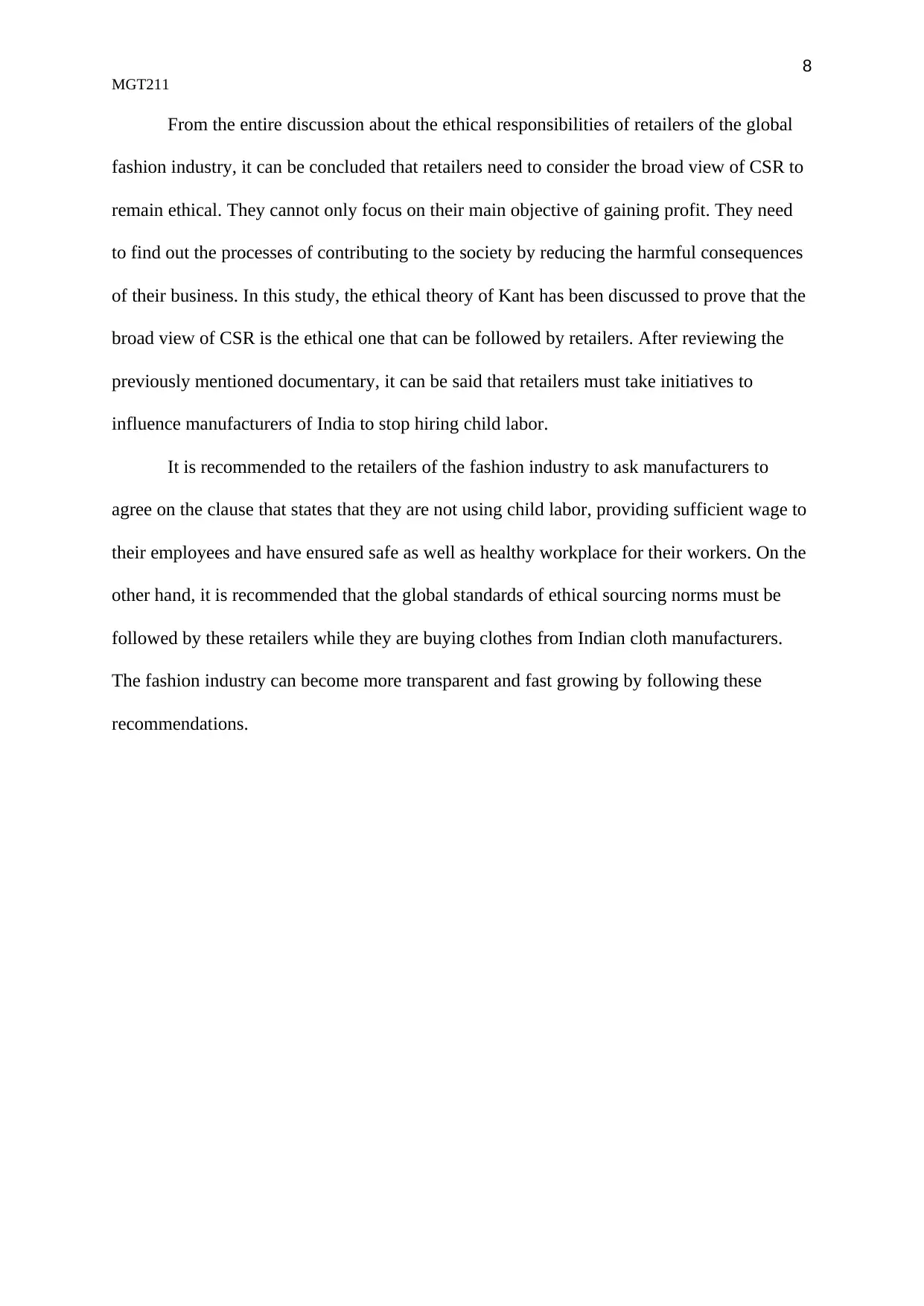
8
MGT211
From the entire discussion about the ethical responsibilities of retailers of the global
fashion industry, it can be concluded that retailers need to consider the broad view of CSR to
remain ethical. They cannot only focus on their main objective of gaining profit. They need
to find out the processes of contributing to the society by reducing the harmful consequences
of their business. In this study, the ethical theory of Kant has been discussed to prove that the
broad view of CSR is the ethical one that can be followed by retailers. After reviewing the
previously mentioned documentary, it can be said that retailers must take initiatives to
influence manufacturers of India to stop hiring child labor.
It is recommended to the retailers of the fashion industry to ask manufacturers to
agree on the clause that states that they are not using child labor, providing sufficient wage to
their employees and have ensured safe as well as healthy workplace for their workers. On the
other hand, it is recommended that the global standards of ethical sourcing norms must be
followed by these retailers while they are buying clothes from Indian cloth manufacturers.
The fashion industry can become more transparent and fast growing by following these
recommendations.
MGT211
From the entire discussion about the ethical responsibilities of retailers of the global
fashion industry, it can be concluded that retailers need to consider the broad view of CSR to
remain ethical. They cannot only focus on their main objective of gaining profit. They need
to find out the processes of contributing to the society by reducing the harmful consequences
of their business. In this study, the ethical theory of Kant has been discussed to prove that the
broad view of CSR is the ethical one that can be followed by retailers. After reviewing the
previously mentioned documentary, it can be said that retailers must take initiatives to
influence manufacturers of India to stop hiring child labor.
It is recommended to the retailers of the fashion industry to ask manufacturers to
agree on the clause that states that they are not using child labor, providing sufficient wage to
their employees and have ensured safe as well as healthy workplace for their workers. On the
other hand, it is recommended that the global standards of ethical sourcing norms must be
followed by these retailers while they are buying clothes from Indian cloth manufacturers.
The fashion industry can become more transparent and fast growing by following these
recommendations.
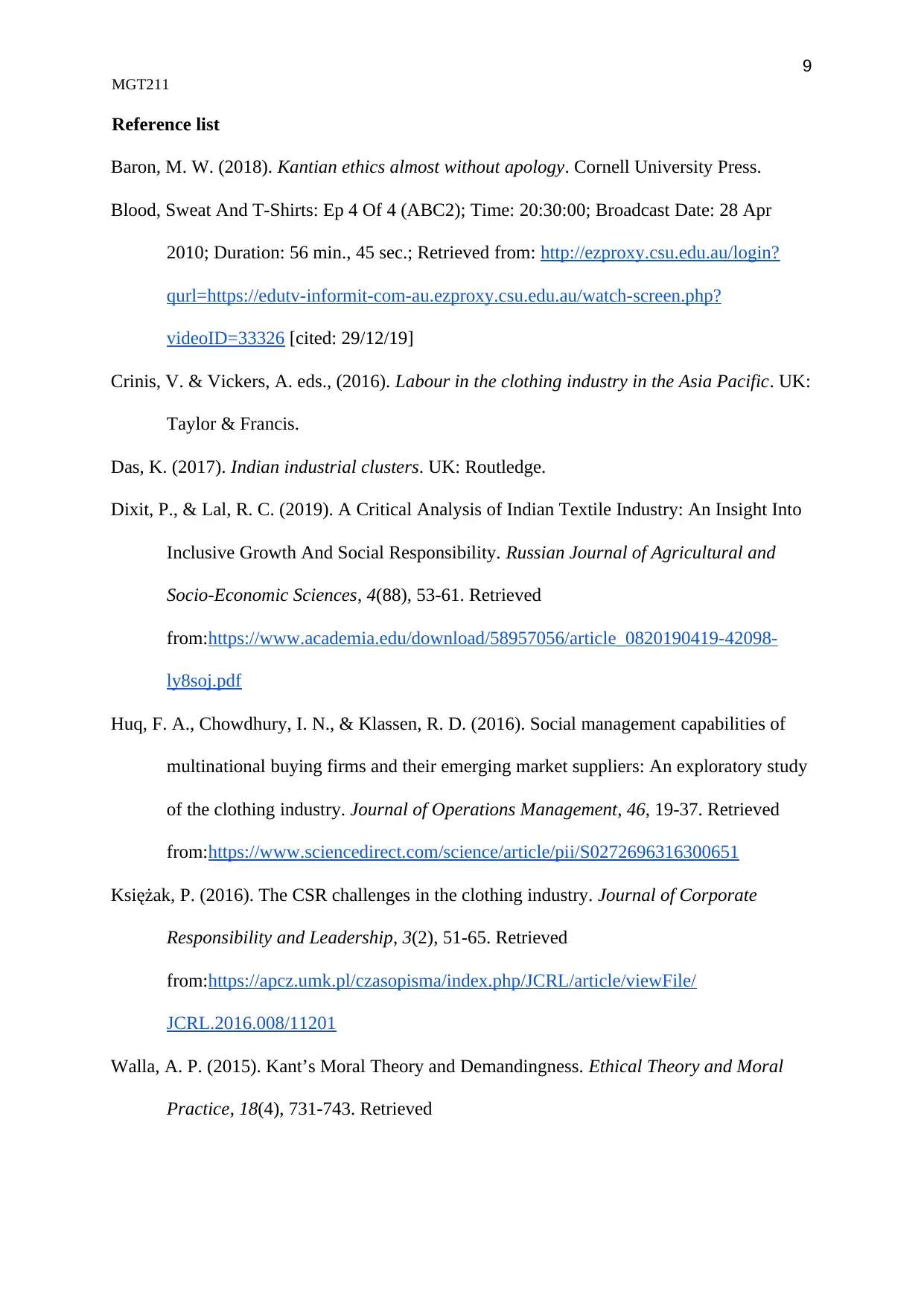
9
MGT211
Reference list
Baron, M. W. (2018). Kantian ethics almost without apology. Cornell University Press.
Blood, Sweat And T-Shirts: Ep 4 Of 4 (ABC2); Time: 20:30:00; Broadcast Date: 28 Apr
2010; Duration: 56 min., 45 sec.; Retrieved from: http://ezproxy.csu.edu.au/login?
qurl=https://edutv-informit-com-au.ezproxy.csu.edu.au/watch-screen.php?
videoID=33326 [cited: 29/12/19]
Crinis, V. & Vickers, A. eds., (2016). Labour in the clothing industry in the Asia Pacific. UK:
Taylor & Francis.
Das, K. (2017). Indian industrial clusters. UK: Routledge.
Dixit, P., & Lal, R. C. (2019). A Critical Analysis of Indian Textile Industry: An Insight Into
Inclusive Growth And Social Responsibility. Russian Journal of Agricultural and
Socio-Economic Sciences, 4(88), 53-61. Retrieved
from:https://www.academia.edu/download/58957056/article_0820190419-42098-
ly8soj.pdf
Huq, F. A., Chowdhury, I. N., & Klassen, R. D. (2016). Social management capabilities of
multinational buying firms and their emerging market suppliers: An exploratory study
of the clothing industry. Journal of Operations Management, 46, 19-37. Retrieved
from:https://www.sciencedirect.com/science/article/pii/S0272696316300651
Księżak, P. (2016). The CSR challenges in the clothing industry. Journal of Corporate
Responsibility and Leadership, 3(2), 51-65. Retrieved
from:https://apcz.umk.pl/czasopisma/index.php/JCRL/article/viewFile/
JCRL.2016.008/11201
Walla, A. P. (2015). Kant’s Moral Theory and Demandingness. Ethical Theory and Moral
Practice, 18(4), 731-743. Retrieved
MGT211
Reference list
Baron, M. W. (2018). Kantian ethics almost without apology. Cornell University Press.
Blood, Sweat And T-Shirts: Ep 4 Of 4 (ABC2); Time: 20:30:00; Broadcast Date: 28 Apr
2010; Duration: 56 min., 45 sec.; Retrieved from: http://ezproxy.csu.edu.au/login?
qurl=https://edutv-informit-com-au.ezproxy.csu.edu.au/watch-screen.php?
videoID=33326 [cited: 29/12/19]
Crinis, V. & Vickers, A. eds., (2016). Labour in the clothing industry in the Asia Pacific. UK:
Taylor & Francis.
Das, K. (2017). Indian industrial clusters. UK: Routledge.
Dixit, P., & Lal, R. C. (2019). A Critical Analysis of Indian Textile Industry: An Insight Into
Inclusive Growth And Social Responsibility. Russian Journal of Agricultural and
Socio-Economic Sciences, 4(88), 53-61. Retrieved
from:https://www.academia.edu/download/58957056/article_0820190419-42098-
ly8soj.pdf
Huq, F. A., Chowdhury, I. N., & Klassen, R. D. (2016). Social management capabilities of
multinational buying firms and their emerging market suppliers: An exploratory study
of the clothing industry. Journal of Operations Management, 46, 19-37. Retrieved
from:https://www.sciencedirect.com/science/article/pii/S0272696316300651
Księżak, P. (2016). The CSR challenges in the clothing industry. Journal of Corporate
Responsibility and Leadership, 3(2), 51-65. Retrieved
from:https://apcz.umk.pl/czasopisma/index.php/JCRL/article/viewFile/
JCRL.2016.008/11201
Walla, A. P. (2015). Kant’s Moral Theory and Demandingness. Ethical Theory and Moral
Practice, 18(4), 731-743. Retrieved
⊘ This is a preview!⊘
Do you want full access?
Subscribe today to unlock all pages.

Trusted by 1+ million students worldwide

10
MGT211
from:http://www.academia.edu/download/37477522/kants_Moral_Theory_and_Dema
ndigness.pdf
MGT211
from:http://www.academia.edu/download/37477522/kants_Moral_Theory_and_Dema
ndigness.pdf
1 out of 10
Related Documents
Your All-in-One AI-Powered Toolkit for Academic Success.
+13062052269
info@desklib.com
Available 24*7 on WhatsApp / Email
![[object Object]](/_next/static/media/star-bottom.7253800d.svg)
Unlock your academic potential
Copyright © 2020–2026 A2Z Services. All Rights Reserved. Developed and managed by ZUCOL.



